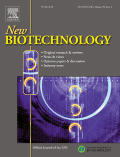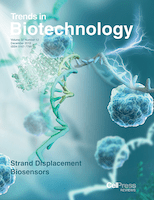
Industrial Biotechnology
Scope & Guideline
Transforming Industry through Biotechnology
Introduction
Aims and Scopes
- Biotechnological Innovations in Production Processes:
The journal showcases research on innovative biotechnological methods for producing enzymes, biofuels, and other bio-based products, emphasizing the efficiency and sustainability of these processes. - Sustainable Utilization of Agricultural and Agro-Industrial Waste:
Research articles often explore the conversion of agricultural by-products and waste into valuable resources, highlighting the potential of waste valorization in reducing environmental impact. - Microbial and Enzymatic Applications:
A significant focus is on the characterization and application of microorganisms and enzymes in industrial processes, including fermentation technologies and bioconversion methods. - Policy and Economic Insights:
The journal also addresses the economic aspects and policy implications of industrial biotechnology, providing insights into market trends, regulatory frameworks, and the bioeconomy. - Emerging Technologies and Applications:
Research on emerging biotechnological applications, such as synthetic biology and nanotechnology, is a core area, indicating the journal's commitment to highlighting cutting-edge developments.
Trending and Emerging
- Carbon Capture and Utilization:
Research on carbon capture methodologies, particularly using microalgae and other biological systems, has gained traction, reflecting the urgent need for solutions to mitigate climate change. - Sustainable Biomanufacturing Practices:
There is an increasing focus on breaking the cost barriers in biomanufacturing, with studies exploring innovative strategies to enhance efficiency and reduce environmental footprints. - Cold-Adapted Enzymes:
The exploration of cold-adapted enzymes has emerged as a significant theme, highlighting their potential in various industrial applications, particularly in processes that require lower energy inputs. - Machine Learning in Biotechnology:
The integration of machine learning techniques in modeling and optimizing bioprocessing is trending, showcasing the journal's commitment to embracing digital innovation in biotechnology. - Bio-based Materials and Polymers:
There is a growing emphasis on the development and application of bio-based building blocks and polymers, indicating a shift towards sustainable materials in various industries.
Declining or Waning
- Traditional Biofuel Production Methods:
Although biofuels remain a relevant topic, there has been a noticeable decrease in publications focusing on conventional biofuel production methods, suggesting a shift towards more innovative and sustainable approaches. - Low-Impact Agricultural Practices:
Research related to traditional low-impact agricultural practices is becoming less frequent, possibly due to the growing emphasis on high-tech solutions and integrated biotechnological approaches. - Single-Use Plastics from Biological Sources:
The exploration of biodegradable plastics derived from biological sources has decreased, likely overshadowed by more pressing discussions on broader sustainable materials and circular economy approaches. - Microbial Bioremediation Techniques:
While still important, studies specifically focusing on microbial bioremediation are appearing less frequently, as attention shifts towards integrated biotechnological solutions for environmental challenges. - Conventional Fermentation Processes:
There is a waning interest in conventional fermentation processes, with more emphasis now placed on advanced methods and the integration of machine learning and automation in bioprocessing.
Similar Journals

PREPARATIVE BIOCHEMISTRY & BIOTECHNOLOGY
Advancing biochemistry and biotechnology for a healthier tomorrow.PREPARATIVE BIOCHEMISTRY & BIOTECHNOLOGY, published by Taylor & Francis Inc, serves as a vital platform for advancing research in the fields of biochemistry, biotechnology, and related areas of medicine. With an ISSN of 1082-6068 and an E-ISSN of 1532-2297, this journal has established itself with a notable Q3 ranking in the 2023 categories of Biochemistry, Biotechnology, and Miscellaneous Medicine, reflecting its relevance and contribution to these disciplines. The journal encompasses a wide range of topics, providing crucial insights into preparative methods, innovative biotechnological applications, and their implications for various medical advancements. Although not open access, the journal's rich content is crucial for researchers and professionals aiming to stay abreast of the latest developments and methodologies in biochemistry and biotechnology. With an enduring commitment to excellence since its inception in 1996, the journal remains an essential resource for academics and practitioners dedicated to advancing scientific knowledge and practical applications.

Journal of Material Cycles and Waste Management
Connecting Ideas for a Circular EconomyThe Journal of Material Cycles and Waste Management, published by Springer, stands as a pivotal resource in the fields of material cycles and waste management, addressing critical challenges related to the sustainability of materials and the efficient disposal of waste. With an impact factor reflective of its significant contribution to the scientific community, this journal publishes innovative research that spans a diverse range of topics, from recycling technologies to lifecycle assessment. The journal ranks in the Q2 category for both Mechanics of Materials and Waste Management and Disposal, highlighting its respected position in academia. Operating without open access, the journal seeks to engage researchers, professionals, and students alike, providing a platform to advance knowledge and foster collaboration in the pursuit of sustainable material management solutions. Located in Japan and adhering to a high standard of editorial excellence, the journal is a must-read for those invested in optimizing resource use and minimizing environmental impacts.

New Biotechnology
Catalyzing Collaboration in Biotechnology ResearchNew Biotechnology, published by Elsevier, is a distinguished academic journal focused on the innovative realms of biotechnology and bioengineering. With an impact factor reflecting its strong presence in the field, this journal serves as a vital resource for researchers and professionals in the life sciences, offering insights into cutting-edge advancements and applications in biotechnology, molecular biology, and related disciplines. The journal's open access policy enhances its accessibility, allowing broad dissemination of knowledge and research findings. With a robust set of Scopus ranks placing it in the top tiers of its categories, including rank #36 in Biotechnology and #24 in Bioengineering, New Biotechnology represents a critical platform for scholars aiming to contribute to the ongoing dialogue in these rapidly evolving fields. Since its inception in 2008 and continuing through to 2024, the journal remains committed to fostering innovation and collaboration among scientists dedicated to advancing biotechnological applications, thereby significantly impacting medicine and industry.

PROCESS BIOCHEMISTRY
Pioneering insights in process biochemistry since 1950.PROCESS BIOCHEMISTRY is a premier journal published by Elsevier Science Ltd, dedicated to advancing the field of biochemistry, microbiology, and bioengineering. With an ISSN of 1359-5113 and an E-ISSN of 1873-3298, this renowned journal is recognized for its impactful contributions, as demonstrated by its Q2 ranking in Applied Microbiology and Biotechnology, Biochemistry, and Bioengineering categories as of 2023. Covering a wide array of topics since its inception in 1950, PROCESS BIOCHEMISTRY serves as a crucial platform for researchers and professionals to disseminate innovative findings and develop new insights in enzyme technology, metabolic pathways, and bioreactor design. Although the journal operates under a non-open access policy, it remains vital for those engaged in cutting-edge biochemical research and development. Located in the United Kingdom, it continues to facilitate scientific discourse and foster collaboration among industry experts and academic scholars worldwide.

TRENDS IN BIOTECHNOLOGY
Shaping Tomorrow's Biotechnology TodayTRENDS IN BIOTECHNOLOGY, published by CELL PRESS, stands as a premier journal since its inception in 1983, focusing on the dynamic and ever-evolving fields of bioengineering and biotechnology. With a notable impact factor and ranking in the top quartile (Q1) of its categories for 2023, this journal is recognized for its contribution to advancing scientific knowledge, boasting a Scopus rank of #5/311 in Biotechnology and #5/162 in Bioengineering, placing it in the 98th and 97th percentiles, respectively. Although it does not operate under an open access model, TRENDS IN BIOTECHNOLOGY ensures a rigorous peer-review process that provides a platform for high-quality research that influences both academic and industrial advancements. The journal's objectives encompass the dissemination of cutting-edge research findings, reviews, and insights that foster innovation in biotechnological applications, making it an invaluable resource for researchers, professionals, and students alike. With its broad scope across the intersection of biosciences and technology, TRENDS IN BIOTECHNOLOGY continues to lead discussions and developments that shape the future of the biotechnology landscape.

Microbial Cell Factories
Fostering Global Collaboration in Microbial ResearchMicrobial Cell Factories is a premier peer-reviewed journal dedicated to the field of applied microbiology and biotechnology, published by BMC in the United Kingdom since 2002. With an impressive impact factor, this journal has consistently ranked within the Q1 category across multiple disciplines, including Applied Microbiology, Bioengineering, and Biotechnology, showcasing its significance in the scientific community. The journal’s commitment to open access ensures that innovative research is freely available to researchers, professionals, and students worldwide, fostering collaboration and knowledge dissemination. With a strong presence in Scopus rankings, Microbial Cell Factories is recognized for its contributions to advancing the understanding and application of microbial processes in production systems, making it an essential resource for those involved in the microbiological and biotechnological fields.

Biotechnology Journal
Connecting researchers to the latest breakthroughs in biotechnology.Biotechnology Journal, published by WILEY-V C H VERLAG GMBH, stands at the forefront of biotechnological research and innovation, recognized for its significant contributions to the fields of applied microbiology, molecular medicine, and broader biotechnology. With its ISSN 1860-6768 and E-ISSN 1860-7314, this journal has achieved impressive 2023 quartile rankings, positioning itself in Q1 for both Applied Microbiology and Biotechnology and Medicine (miscellaneous), and Q2 in Molecular Medicine, showcasing its impact and relevance within the scientific community. Based in Germany, the journal aims to disseminate high-quality research that drives advancements in biotechnological applications, fostering a platform for researchers, professionals, and students to engage with cutting-edge developments. With its ongoing commitment to excellence, the Biotechnology Journal is an essential resource for those seeking to stay informed about the latest trends and innovations in biotechnology.

Biotechnology and Genetic Engineering Reviews
Connecting Researchers and Trends in Genetic Innovation.Biotechnology and Genetic Engineering Reviews is a prominent journal published by Taylor & Francis Ltd, specializing in the rapidly evolving fields of biotechnology and genetic engineering. Since its inception in 1984, this journal has served as a critical platform for researchers and professionals to disseminate groundbreaking scientific findings, review methodologies, and discuss emerging trends within the domain. With a substantial track record of convergence in its publication history from various years, it currently holds Q2 rankings in both Bioengineering and Biotechnology, alongside a Q3 ranking in Molecular Biology for 2023. Its dedication to quality research is reflected in its Scopus rankings, which position the journal favorably within the competitive landscape of biochemistry and molecular biology. Although it is not an open-access journal, Biotechnology and Genetic Engineering Reviews remains committed to providing accessible insights to the global scientific community, making it an invaluable resource for students, academics, and industry professionals keen on advancing their knowledge in these crucial fields.

JOURNAL OF INDUSTRIAL MICROBIOLOGY & BIOTECHNOLOGY
Exploring Innovative Solutions for a Sustainable FutureJOURNAL OF INDUSTRIAL MICROBIOLOGY & BIOTECHNOLOGY, published by Oxford University Press, is a vital resource for researchers and professionals actively engaged in the fields of applied microbiology, biotechnology, and bioengineering. With an ISSN of 1367-5435 and E-ISSN of 1476-5535, this journal has established itself as a leading platform for disseminating innovative research findings and advancing knowledge in industrial microbiology since its inception in 1996. As of 2023, it is classified in the Q2 quartile across multiple categories including Applied Microbiology and Biotechnology, Bioengineering, and Medicine, underscoring its significance in the academic community. Notably, it ranks 26th of 127 in Applied Microbiology and Biotechnology, placing it in the 79th percentile, indicative of its high impact and influence. Although it does not currently offer Open Access, it remains a key outlet for high-quality scholarly articles that align with the objectives of improving industrial practices through biotechnological applications. For those interested in the latest developments and methodologies within the realm of applied microbiology and biotechnology, this journal serves as an indispensable reference.

BIOTECHNOLOGY ADVANCES
Pioneering Innovations in BioengineeringBIOTECHNOLOGY ADVANCES is a premier, peer-reviewed journal published by PERGAMON-ELSEVIER SCIENCE LTD, dedicated to advancing knowledge in the rapidly evolving fields of biotechnology and bioengineering. With an ISSN of 0734-9750 and an E-ISSN of 1873-1899, this esteemed journal covers a wide spectrum of topics relevant to applied microbiology, molecular biology, and biochemical innovation. Recognized for its academic rigor, it holds a distinguished position in the top quartile (Q1) in multiple categories, including Applied Microbiology and Biotechnology, Bioengineering, and Biotechnology, further evidenced by its high rankings in Scopus, where it ranks #3/127 in Applied Microbiology and Biotechnology and #7/311 in Biotechnology. Researchers and professionals in the field value the journal not only for its comprehensive coverage of cutting-edge research but also for its commitment to disseminating critical findings and fostering collaboration. While BIOTECHNOLOGY ADVANCES currently operates under a subscription model, its potential impact on future innovations in biotechnology cannot be overstated, making it an essential resource for anyone interested in the forefront of biotechnological advancements.